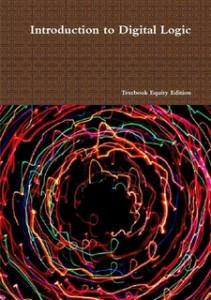
James Feher,”Introduction to Digital Logic” with Laboratory Exercises (2010)
This lab manual provides an introduction to digital logic, starting with simple gates and building up to state machines. Students should have a solid understanding of algebra as well as a rudimentary understanding of basic electricity including voltage, current, resistance, capacitance, inductance and how they relate to direct current circuits.
Buy Print Format $23.49 (99 pages, B&W)
ISBN 978-1-312-50167-6
Download Free PDF (100 pages, color, 3.2 Mb)
Extra Features
- Peer Reviewed
Exercises & Solutions
Table of Contents
1. Introduction
2. The transistor and inverter
The transistor
The breadboard
The inverter
3. Logic gates
History of logic chips
Logic symbols
Logical functions
4. Logic simplification
De Morgan’s laws
Karnaugh maps
Circuit design, construction and debugging
5. More logic simplification
Additional K-map groupings
Input placement on K-map
Don’t care conditions
6. Multiplexer
Background on the “mux”
Using a multiplexer to implement logical functions
7. Timers and clocks
Timing in digital circuits
555 timer
Timers
Clocks
Timing diagrams
8. Memory
Memory
SR latch
Flip-flops
9. State machines
What is a state machine?
State transition diagrams
State machine design
Debounced switches
10. More state machines
How many bits of memory does a state machine need?
What are unused states?
11. What’s next?
Appendices
Appendix A: Chip pinouts
Appendix B: Resistors and capacitors
Resistors
Capacitors
Appendix C: Lab notebook
Appendix F: Solutions
Chapter 1 review exercises
Chapter 2 review exercises
Chapter 3 review exercises
Chapter 4 review exercises
Chapter 5 review exercises
Chapter 6 review exercises
Chapter 7 review exercises
Chapter 8 review exercises
Chapter 9 review exercises
